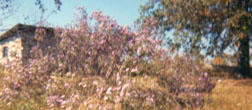 Lilac in May. Behind that is the potato house. The potatoes were in bushel baskets on a platform off the dirt floor, and Mamaw's canning was on rough plank shelves along the wall by the door. It smelled like clean dirt and creek banks and shade.
Lilac in May. Behind that is the potato house. The potatoes were in bushel baskets on a platform off the dirt floor, and Mamaw's canning was on rough plank shelves along the wall by the door. It smelled like clean dirt and creek banks and shade.
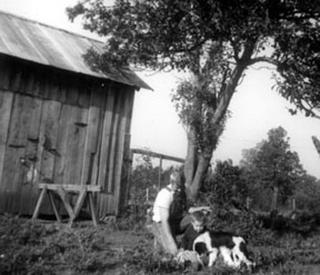 Smokehouse. After the cold had settled in, more than just a frost or two, they'd slaughter some hogs. For days the house smelled of it. My grandmother made sausage and they salted hams and slabs of bacon. While the meat was fresh there were pork chops and, my favorite still, tenderloin, and my grandmother grumbled and worried at us all not to make ourselves sick eating all that fresh meat. When the smoking started, it was small, slow fires of hickory, banked to burn long and smoky. The cracks were stopped up in the building and all that smoke permeated the wood as much as the meat, so that long afterward the scent stayed. Before I saw this picture, I had been wondering where apples came from: that's an apple tree there in front of the garden. That's Daddy with the Camel in his hand and Glenn with the lapful of puppies.
Smokehouse. After the cold had settled in, more than just a frost or two, they'd slaughter some hogs. For days the house smelled of it. My grandmother made sausage and they salted hams and slabs of bacon. While the meat was fresh there were pork chops and, my favorite still, tenderloin, and my grandmother grumbled and worried at us all not to make ourselves sick eating all that fresh meat. When the smoking started, it was small, slow fires of hickory, banked to burn long and smoky. The cracks were stopped up in the building and all that smoke permeated the wood as much as the meat, so that long afterward the scent stayed. Before I saw this picture, I had been wondering where apples came from: that's an apple tree there in front of the garden. That's Daddy with the Camel in his hand and Glenn with the lapful of puppies.
 Corn crib and the barn pond. The corn crib was built like a log cabin, notched logs. It was set up off the ground and there was metal flashing around to keep rats out of the corn that was supposed to go to feed the chickens and hogs. There was a sort of lean to on either side of the main section. One side sheltered some tools like the plow and cultivator, and the other side held the wagon. We decorated the walls of the shed with pages torn from magazines and catalogues borrowed from the outhouse, stuck them onto nailheads and splinters. The wagon itself could be anything or nothing more than a place to climb or to sit and be dusty away from grownups.
Corn crib and the barn pond. The corn crib was built like a log cabin, notched logs. It was set up off the ground and there was metal flashing around to keep rats out of the corn that was supposed to go to feed the chickens and hogs. There was a sort of lean to on either side of the main section. One side sheltered some tools like the plow and cultivator, and the other side held the wagon. We decorated the walls of the shed with pages torn from magazines and catalogues borrowed from the outhouse, stuck them onto nailheads and splinters. The wagon itself could be anything or nothing more than a place to climb or to sit and be dusty away from grownups.
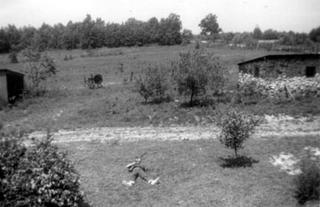 This is from Uncle Will's room, which was part of our play ground. Not very strong on private property. That's Larry Joe with the BB gun. Chicken house, some old saw I never saw in use, potato house. The BB gun reminds me: The steps to the upstairs were just framed, not finished, and between the studs people hung spare overalls and jackets and there was always a 410 and a 22 leaning there with shells and bullets on a ledge above them. All the kids there were running around and not one of us bothered the guns. The closest we ever came to that was when we found some shotgun shells in Uncle Will's foot locker and proceeded to drop them one by one into the well [which was shallow and rock-lined] in the hope that one would go off like a cap pistol. The shells didn't go off, but our mothers did.
This is from Uncle Will's room, which was part of our play ground. Not very strong on private property. That's Larry Joe with the BB gun. Chicken house, some old saw I never saw in use, potato house. The BB gun reminds me: The steps to the upstairs were just framed, not finished, and between the studs people hung spare overalls and jackets and there was always a 410 and a 22 leaning there with shells and bullets on a ledge above them. All the kids there were running around and not one of us bothered the guns. The closest we ever came to that was when we found some shotgun shells in Uncle Will's foot locker and proceeded to drop them one by one into the well [which was shallow and rock-lined] in the hope that one would go off like a cap pistol. The shells didn't go off, but our mothers did.
Here are a few I didn't take myself, the only ones with me in them:

Me with Papaw Yates. The well is in the background. The oak tree beside us was the most important thing in the yard. My cousins and I played cowboys and Indians around it (I wanted to be an Indian when I grew up). My Uncle Will's funeral was held in its shade. Nothing much grew around it, but then it wasn't a very fertile farm. Two mules, four or five cows for milk and butter and heifers to sell, hogs to butcher when it was cold enough.
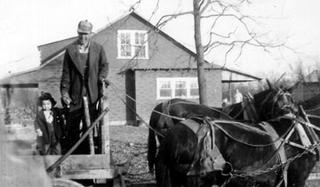
Uncle Will, Wilburn, was a batchelor, which was a shame because he was better with kids than any of his brothers (and among them they had plenty). He took care of the farm for my grandparents. He had hound dogs: fox hounds and coon hounds, and he and his neighbors went out on clear fall nights and listened to the dogs run. They'd have a fire and tell lies and (I have reason to suspect) pass around a Mason jar. The only thing I knew him to bring back from one of those evenings was a fox kit in a burlap sack. He brought it into the living room and tipped it out onto the floor. It was small and scared and I wanted to make a pet of it. Uncle Will used his pen knife to cut a chew of tobacco off a plug and with the same knife whittled bits of twig to fit in spools for me to use as twirling tops or dolls. He died after he got caught in the rain riding my mare Gypsy to McEwen to be bred, and my grandmother blamed the horse, not being the sort to blame the child. During his wake the men sat out all night in folding chairs in the front yard and the women in the front room. It was all a quiet buzz. Upstairs, I couldn't sleep. I'd look out the front window and watch the cigarettes flare and burn, go out, and start up again. Me. Coming and going.
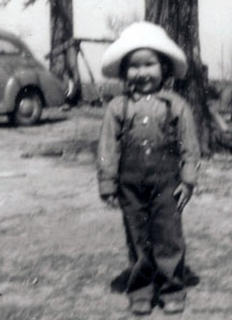

Ordinarily I use this site for dribs and dabs of memories, but I was looking for a photo the other day and ran across a stack of shapshots taken at the farm in Dickson County, what we called "down at the country." Since my modem is slow, I'll just post a few at a time. There are quite a few.
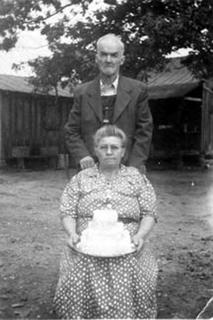
My Grandparents. I'm not sure of the date, but believe the building behind them was the "old house". When my father and his brothers came back from WWII, they built them a new one. James and Mary. To me they were Mamaw and Papaw Yates, and if he looks less than cheerful to you, that's the only way I ever saw him. By the time I was old enough to notice, he rarely spoke, ate little more than cornbread soaked in buttermilk, and had violent spells. Truth to tell, no one seemed heartbroken when he passed, least of all my grandmother, who had been putting up with it for too long.
My grandmother was very short and round with thin hair she never cut because "hair is woman's crown and glory". She always said she was Dutch, but even excluding the wars with the Deutsch folk, there is a lot of variation among the people labeled Dutch. She worked. Hard. Liked to read when she could. There were always farm magazines around, and Reader's Digests and the Digest joke books, but she stashed novels in her little bedroom off the back porch. Named her two daughters Carmen and Harriet Arlena Maria. She milked by hand, churned, cooked on a wood stove, drew all her water from a well in the front yard, gardened and canned, raised and killed and plucked her own chickens, and would make a special jam cake for me in a little heart-shaped pan--no icing. The cake in her lap is probably coconut.
Writing. I took a sip of coffee. Not sure just how long it's been sitting here, but it tastes like cold woodsmoke.
There are some times more than others when I miss family. Labor Day weekend is one. Funny that it's not the Forth. They were both big Yates family get-together days, probably still are, just I haven't been to anything since Daddy died. I got asked to Uncle Tom and Aunt Dot's anniversary a few years back but I was in one of my intend-well, do nothing modes and not only didn't do the gift thing I had planned, I didn't even RSVP when I realized there was no way I could manage it all. I know why I am all family fractured. Don't know why Glenn doesn't keep up with anybody but Aunt Harriet.
Still, I miss them all now, or maybe miss the people we used to be.
We would run around acting crazy and generally making nuisances of ourselves. We'd chase each other around and over the loose hay and baled in the barn loft and sit there with daring, dangling our feet out the wide loft window. There were tadpoles in the pond to catch and kittens to scratch the daylights out of us when we tried. Green persimmons were for shoving onto the end of sticks and flinging as far as we could.
After we ate, in the long afternoon's heat, there was Yellow Creek to go to. Clear as pale green glass, sparkling with minnows, and fed by springs said to be 52 degrees the year round. I couldn't swear to the temperature, only know that the first dip in would take your breath and there wasn't anyone, man, woman or child who didn't have to climb, blue-lipped and shivering, out onto the rock to thaw in the hot sun. And repeat until exhaustion made us cross and we were hauled back up to the house to shuck out of wet bathing suits in the hot, tin-roofed attic with its blue-black dirt daubers. We would collapse up there. I could still feel the movement of the water around me in my sleep.
The end supposes the beginning. The dog wags the tail or the tail wags the dog. There was a trail down the hollow when I was a little girl, but the trail went under the barbed wire fence that was rusted so badly it was about to fall apart and sagging so low that even a little girl could wind up with snagged pants if she tried to slip underneath it. I know, because I did try, and lost it in the end. It is hard to extricate oneself from barbed wire when all alone in a ditch. I wondered what would have happened. Could I wind up stuck there forever? Would snakes come and tickle my ankles. Would spiders build webs in my hair? Would the birds laugh at my problem? Would the squirrels swear at my being in their back yard? Would the foxes come at night and bark at me.The foxes in the hills around my grandmother's did bark. I heard them before, in the nights when I crawled out of my nest of four quilts, so heavy I could hardly breathe beneath them, much less move, having to pee, hating the little chamber pot under the bed because it was so easy to miss. I would pad barefoot out of the cold front bedroom through the living room where my grandmother slept in her rocker beside the banked stove. She could not sleep lying down; asthma, she said. Open the door, open the screen, creaking but quiet, onto the smooth concrete front porch.Outside the smell of hickory woodsmoke filled the air. The air was still and frigid, cracking. There was no sound nearby, no birds, the dogs all in their house curled in a warm ball together, the chickens in their coop all puffed (no baby chicks yet beneath light bulbs, in a month or two the mail order peepers will come). No one about but me and the moon, making hard shadows, and off in the distance up the hill past the hollow with the tiny creek and the barbed wire, the foxes, not like dogs at all, calling out the cold night. Then I went to the moon, shaking scared of the foxes and chilled and pulled down my pants to pee steam off the edge of the porch.












